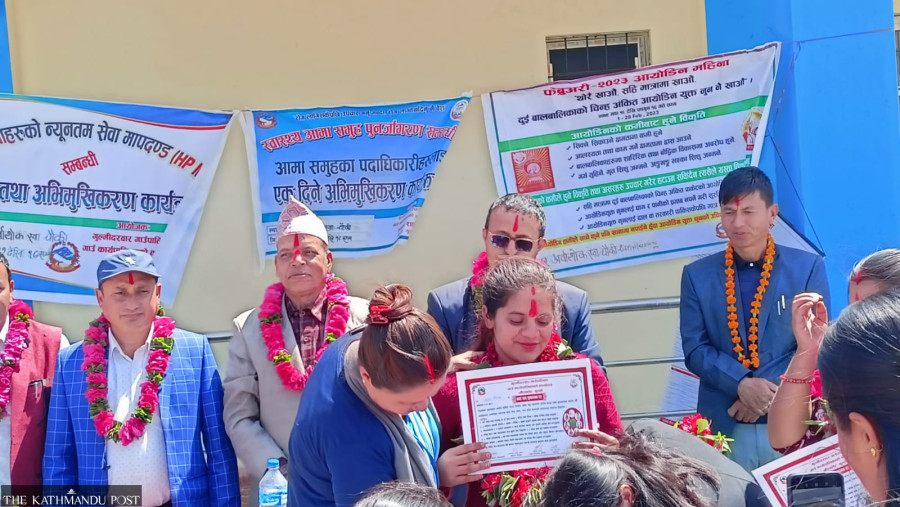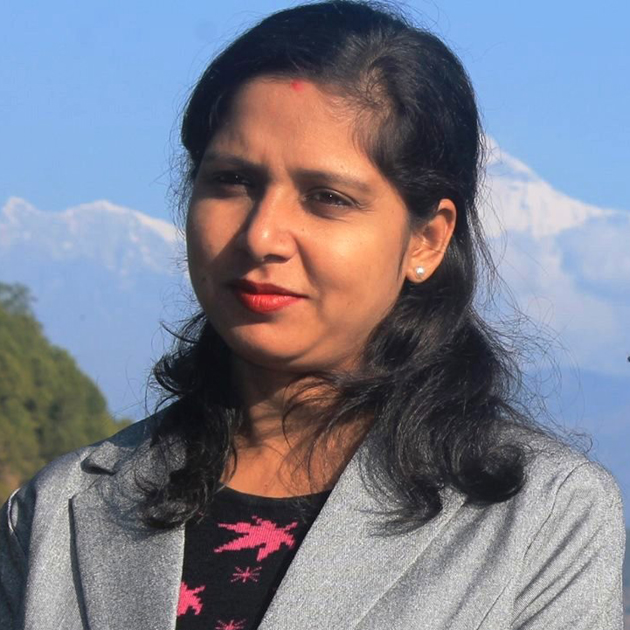Health
Local governments seek male participation to enhance safe motherhood initiatives
The awareness campaign targeting pregnant women, new mothers and would-be fathers is mostly conducted at the initiation of female elected representatives.
Amrita Anmol
“Dear Papa,
My mother’s womb is my home; I get nourishment from what she eats. If she is hungry, I am hungry. Please provide mum with nutritious food so that I too can grow healthy. After my birth, weigh me regularly and immunise me. I am the future of the nation and if I am healthy, I can grow up to contribute to the country. Please read this letter aloud to my grandfather and grandmother as well.
With love,
Your future and dreams.”
The Gulmi Durbar Rural Municipality in Gulmi sent a letter to this effect to all would-be fathers in the local unit with the objective to have fathers play a bigger role in the well-being of their pregnant wives and unborn children. Women, once they conceive, are expected to take the entire responsibility of caring for their children while in the womb and after birth.
The local unit is working to dispel this long-held practice, especially in rural areas by having not just the fathers but also other male members of the family to actively participate in the child-rearing process right from the prenatal stage.
As part of the campaign, a team of people’s representatives, health workers and female community health volunteers visit the homes of pregnant women and hand over the letter to the expectant father. If the father is away, the letter is dispatched to where he is. The letter aims to educate the father about his duty to care for his expecting wife, provide her with nutritious food, take her for regular health check-ups during pregnancy and after delivery and fully immunise the newborn.
The rural municipality started the awareness campaign at the start of the current fiscal year.
After identifying a pregnant woman’s residence, elected representatives of the local unit put up a green flex board at the house. On their visit, they congratulate the woman on her new beginning as a mother. The health workers then inform the expecting mother about the importance of regular health check-ups with at least eight mandatory visits to the health centre since conception. They encourage the women to go for institutional birth; give them lessons on how to take care of themselves and their newborn, among other vital information.
Gulmi Durbar Rural Municipality has paid visits to at least 173 expecting parents and their families since the start of the campaign. It has also arranged for ambulance services for pregnant women free of cost. The local unit provides 36 eggs to pregnant women during pregnancy and 30 more during the postpartum period. Post delivery, the female community health volunteers conduct 60 mandatory visits to the new mother and her newborn until the child turns two.
“We have launched the campaign with the objective to ensure safe motherhood. This is an attempt to create an atmosphere of responsibility towards expecting mothers and new mothers to safeguard the rights of mothers and their newborn,” said Tara Thapa Dhenga, the vice-chairperson of Gulmi Durbar Rural Municipality.
The awareness campaign targeting pregnant women, new mothers and would-be fathers is mostly conducted at the initiation of female elected representatives in several local units across the country.
Barekot Rural Municipality in Jajarkot in Karnali province also initiated a similar campaign some three years ago wherein the local unit dispatches “awareness” letters to expectant fathers underlining the core message of safe motherhood .
“The rural municipality launched the ‘Vice-chairperson with Pregnant Woman Programme’ to promote safe motherhood and institutional birth rate. The carers of pregnant women are frequently counselled for the safe future of children,” said Mahendra Bahadur Shah, former chairman of Barekot Rural Municipality. According to him, the institutional birth delivery rate has jumped to 81 percent from 50 percent over the past three years in Barekot.
Gandaki Rural Municipality of Gorkha in Bagmati province started providing Rs4,200 to each pregnant woman as a nutrition allowance from this fiscal year. Several local units have launched similar programmes to provide support to pregnant women and postpartum mothers.
The federal government provides allowances to pregnant women who undergo safe delivery at health institutions. Women in the mountainous, hilly and Tarai regions are provided Rs3,000, Rs2,000 and Rs1,000 respectively. Additionally, a cash bonus of Rs800 is provided to mothers who complete all four antenatal checkups.
“Most of the local units started providing additional allowances and other benefits to pregnant women. Women from poor economic backgrounds have benefited from the programme,” said Laxmi Pandey, chairperson of the National Federation of Rural Municipalities. She reiterates that it is the basic right of each woman to get safe motherhood and reproductive health services in the country.
Article 38 of the constitution of Nepal affirms that every woman shall have rights to safe motherhood and reproductive health. Safe Motherhood and Reproductive Rights Act 2018 was enacted to make health services safe, qualitative and accessible for safe motherhood.
The maternal mortality rate is gradually decreasing apparently due to effective safe motherhood programmes launched at the local level. As per the national census carried out in 2011, the maternal mortality rate was 239 per 100,000 live births. It was reduced to 151 in the latest national census of 2021.
Experts, however, argue that the maternal mortality rate is still high in the country. The government is committed to achieving the UN’s Sustainable Development Goals (SDGs). The health target under the SDGs is to reduce the maternal mortality rate to 70 for every 100,000 births by 2030.
People working in the reproductive and maternal health sector say to achieve further improvement in reproductive health, and maternal and infant mortality rates, it is important to change the perspective of how reproductive health is still perceived in Nepal in that the responsibility of giving birth to a healthy baby should not fall only on the mother.
Sabin Shrestha, executive director of the Forum for Woman, Law and Development, stressed the need for enhancing the roles of men to improve the overall quality of reproductive health in Nepal. “Reproductive health should not be viewed only as a woman’s issue. Every member of the family should participate in taking care of the mother and her baby,” said Shrestha.




 25.15°C Kathmandu
25.15°C Kathmandu















